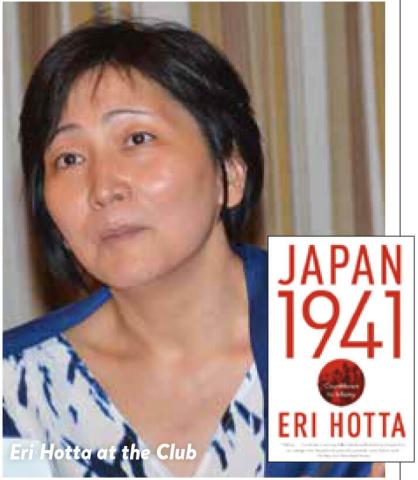Issue:
The author of an acclaimed book on Japan’s entry into WWII discusses the causes and dismisses any comparison to today’s government activities.
Eri Hotta and Japan 1941
by SUVENDRINI KAKUCHI
BEST SELLING AUTHOR ERI HOTTA was the guest of honor at a Book Break held by the Library Committee in July to discuss her book, Japan 1941: Countdown to Infamy. It was an extremely timely subject, coming as it did in the midst of the Abe administration’s push to enact bills that would effectively change the nation’s interpretation of the peace clause, Article 9, in the Japanese Constitution.
Hotta was born in Tokyo and educated in Japan, the United States, and Britain. She has taught at Oxford, in Tokyo and Jerusalem. She is also the author of Pan Asianism and Japan’s War, 1931-45.

Q: In your book you describe how the leaders in Japan in 1941 knew that the odds were stacked against the country if they were to go to war with the United States. Why, then, did they take the decision to bomb Pearl Harbour?
A: The attack was carried out without a formal termination of diplomatic relations by Japan, let alone a declaration of war. But Prime Minister General Hideki Tojo described the Japanese offensive as a desperate, defensive battle: Japan (he believed) was the victim of Washington’s unwillingness to yield an inch on its demands including the Japanese withdrawal from China and a rejection of Japan’s puppet government in Nanjing. The official rendition of events reveals that Japanese leaders at that time harboured deep seated feelings of persecution and wounded national pride.
In my book, I point out how the leaders were torn about going to war. Take Tojo for example. In public he appeared gung-ho but, in fact, he felt uncertain about going to war because he was rationally aware of the small possibility of a Japanese victory. Prince Konoe, who was the prime minister until mid October, and almost everyone else in the top leadership felt the same. Yet surviving records show that they were responsible for making a conscious and collaborative decision to go to war with the West having talked themselves into believing that they were victims of circumstances.
They were guilty of negligence concerning what would happen after the initial offensive. It was a huge national gamble that risked the lives of people and those in the countries Japan had attacked and invaded. The tragic irony is that Japanese culture, with its intrinsic preference for consensus and harmony however superficial could not help encourage honest discussion at the critical junctures.
Q: Seventy years after the defeat, are any lessons to be learned as we watch the debate on new security bills in the Japanese Diet?
A: I don’t see an illuminating comparison between the crisis enveloping Japan in 1941 and what is going on now under the leadership of Prime Minister Abe, despite his support of revisionism and nationalism in order to, as he puts it, bring back Japan’s confidence. Abe can afford to continue his strong posturing because Japan, the most loyal Cold War ally in the region, remains under the U.S. umbrella. Everyone takes for granted that there will be no full fledged war.
But Abe’s tough talk is highly problematic. He paints an idealized portrait of Japan’s imperialistic past in which his grandfather, Nobusuke Kishi, played no small part. He denies historical interpretations that, inconveniently, do not fit his version. That kind of intellectual inflexibility, presented as a national norm by a top political leader of a state, is highly misleading and does great disservice to Japan.
Q: How do you view Abe’s and other political leaders’ visits to Yasukuni, Japan’s war shrine? The reasoning by Japanese leaders is that it is a visit to pray for peace. How would you explain this complex approach?
A: I wouldn’t say it’s a complex approach, but a wrong headed one. Japan’s ultranationalistic discourse on its war past is based on two ideologies a nostalgia for the military past and the peace that we have enjoyed for the last 70 years. There is no direct causal link between war and peace in this situation.
The tendency of the ultraright to insinuate that many people died in order to safeguard Japan’s interests and peace misses the point. The truth is that too many died, civilians and those fighting overseas, and Japan lost the war despite of all those deaths. Peace might have come without those deaths and losses, and without having fought the illogical, unwinnable war.
It is an uncomfortable question because it cuts to the heart of war responsibility that is the original war responsibility of who started/condoned the war, and whether the war could have been avoided altogether. After the war, some conservative aspects of the old order most notably the imperial system were perpetuated and further buttressed by the U.S. Cold War policy for the sake of stability. This also made it difficult for post war Japan to face up to these difficult questions.
Q: Then what would you say would constitute a real apology from Japan for its war of aggression in Asia?
A: The key obstacle in Japan to any kind of reconciliation, in a general sense, is that history is too bothersome to think about. We have the presumption that so long as we can chant pacifist mantra, we have successfully made ourselves a peace loving nation and we are off the hook from examining our more unsavory past. In a more official sense, there are lessons to be learned from post war Germany. Willy Brandt spontaneously fell on his knees in front of Warsaw Ghetto Uprising memorial and this moment is still remembered as an apology for the past.
Suvendrini Kakuchi is a correspondent for the UK-based University World News, with a focus on higher education issues.

